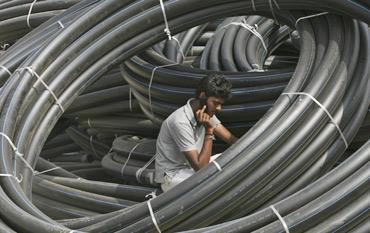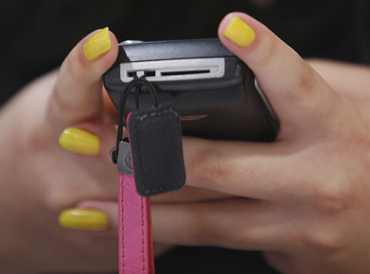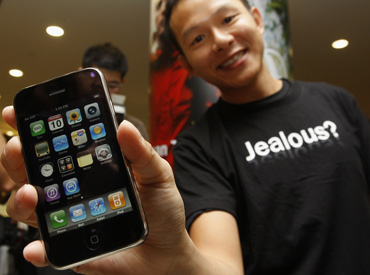Photographs: Krishnendu Halder / Reuters
Heavy use of mobile phones and other wireless communication devices could possibly cause cancer, the World Health Organisation has said and asked people to use texting and free-hands devices to reduce the risk.
The electromagnetic fields generated by such devices are "possibly carcinogenic to humans," the International Agency for Research on Cancer announced at the end of an eight-day meeting on Tuesday in Lyon, France.
A group of 31 experts from 14 countries has "reached this classification based on its review of the human evidence coming from epidemiological studies", ABC News reported.
The experts also pointed to an increased incidence of glioma, a malignant type of brain cancer, International Agency for Research on Cancer said in a statement. The number of mobile phone subscriptions is estimated at 5 billion globally.
"The conclusion means that there could be some risk, and therefore we need to keep a close watch for a link between cell phones and cancer risk," said Jonathan Samet from the University of Southern California, the Chairman of the group of scientists.
Click NEXT tor ead further...
'Important to take pragmatic measures'
Image: Using hands-free devices or texting may help reduce the riskPhotographs: Vivek Prakash / Reuters
The IARC, which is part of the WHO, cautioned that current scientific evidence showed only a possible link, not a proven one, between wireless devices and cancers.
"It is important that additional research be conducted into the long-term, heavy use of mobile phones," Christopher Wild, director of the IARC said.
"Pending the availability of such information, it is important to take pragmatic measures to reduce exposure such as hands-free devices or texting."
Two studies in particular, the largest conducted over the last decade, showed a higher risk "in those that had the most intensive use of such phones." Some individuals tracked in the studies had used their phones for an average of 30 minutes per day over a period of 10 years.
An Australian researcher who was part of the expert team said more research is needed before any real link can be made between mobile phone use and cancer. "Really, what it's saying is there is an observed association between using a mobile phone and a higher risk of brain cancer," Bruce Armstrong of University of Sydney said.
...
'3G technology appears less harmful'
Image: 3G phones in fact give a much lower dose to the brain than the previous generations, says the studyPhotographs: Bobby Yip / Reuters
Armstrong said researchers studied radiowave activity on those who used phones the heaviest and for the longest period, and health risks for average users was "really quite small".
"In the general population, particularly in the younger population, there is just no evidence... that brain tumours are increasing in a way that would suggest that they are related to the greater amount of radio-frequency energy in our environment," he said.
The 3G technology used by iPhones, Blackberry and other mobile phones also appeared to emit less harmful radiowaves, he said. Research on these new technologies was still in its infancy.
"A very important observation, really, just based on the technology, is that the 3G phones in fact give a much lower dose to the brain than the previous generations," Armstrong said.
"Whether, for example, the 3G levels are sufficient to cause brain tumours, we don't know at this stage, because most of the research at this stage was done...on the generation before."
The IARC had previously stated that there was no real health risks associated with long-term mobile phone use. "I think that's a very common principal of public health, that in the face of uncertainty. it's good to take precautions," he said.
He said using hands-free devices, texting or using a landline whenever possible would reduce any of the potentially negative health risks for phone users.
The IARC report that radio frequency electromagnetic fields generated by such devices are "possibly carcinogenic to humans" has resulted in a Group 2B classification.
The classification will now be assessed by the WHO, which can be expected to provide further advice in due course.



article